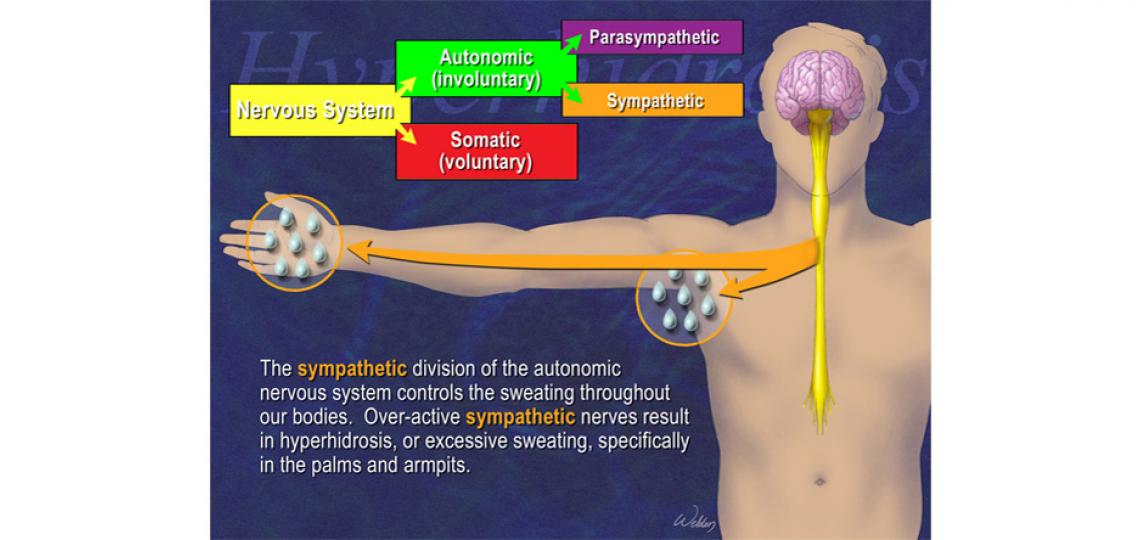Reliable Dermatology Solutions for Excessive Sweating: How to Stop Sweaty Hands and Feet
Reliable Dermatology Solutions for Excessive Sweating: How to Stop Sweaty Hands and Feet
Blog Article
Comprehending the Origin Causes of Excessive Sweating and Its Effect On Life
Too much sweating, additionally called hyperhidrosis, is a problem that impacts a significant portion of the population, yet its underlying reasons and ramifications on daily operating continue to be somewhat enigmatic. While it is frequently recognized as a physical response to regulate body temperature, the triggers for excessive sweating can vary commonly among individuals, encompassing not only physical aspects however also psychological and emotional components. The effect of this condition expands past plain discomfort, usually affecting social communications and total high quality of life. By diving right into the origin of hyperhidrosis and discovering its diverse effects, a deeper understanding of this pervasive concern can be acquired, clarifying the complexities that individuals coming to grips with excessive sweating browse each day.
Physiology of Sweat Glands
The policy of sweat manufacturing, an essential physical procedure, is mainly regulated by the task of sweat glands distributed throughout the human body. Sweat glands are classified into 2 major types: eccrine and apocrine glands.
When the body temperature increases, either as a result of physical activity, heats, or emotional tension, the nerves triggers the sweat glands to create sweat. This sweat is made up primarily of water and electrolytes like sodium and chloride. The procedure of sweat manufacturing is essential for preserving the body's interior temperature level within a slim, optimal variety, highlighting the important duty sweat glands play in human physiology.
Triggers for Excessive Sweating
In comprehending the origin triggers of too much sweating, it is crucial to identify the triggers that can result in this physical action. Too much sweating, additionally called hyperhidrosis, can be motivated by numerous factors, both environmental and physical. One usual trigger is psychological stress or anxiety, which can stimulate the body's sweat glands to produce more sweat than is necessary for cooling. Physical physical effort, high temperatures, and spicy foods are likewise recognized to activate extreme sweating in individuals susceptible to this problem. Furthermore, specific clinical conditions like menopause, diabetes mellitus, or hyperthyroidism can add to extreme sweating also.
In addition, medicines such as some antidepressants, opioids, and particular supplements can likewise act as triggers for hyperhidrosis. Recognizing these triggers is vital in managing too much sweating efficiently - Exessive Sweating. By determining and dealing with the details triggers that trigger too much sweating in a private, doctor can develop tailored treatment plans to alleviate this condition and boost the individual's high quality of life
Medical Conditions Associated
Connected with too much sweating are various clinical conditions that can worsen this physical reaction. One typical problem is hyperhidrosis, a disorder defined by extraordinarily increased sweating that surpasses the body's thermoregulatory demands. This can manifest in focal areas like the hands, soles, underarms, or face, influencing an individual's lifestyle because of social shame and pain.
Additionally, endocrine disorders such as hyperthyroidism, diabetes, and menopausal warm flashes can likewise lead to excessive sweating. Hyperthyroidism causes an overflow of thyroid hormonal agents, accelerating metabolism and causing sweating.
Additionally, infections like tuberculosis, HIV, and endocarditis have been connected with evening sweats, a typical symptom known to interfere with sleep and influence general wellness. These clinical conditions highlight the diverse array of underlying elements that can add to extreme sweating, necessitating thorough evaluation and administration by healthcare professionals.
Emotional and emotional Variables
:max_bytes(150000):strip_icc()/the-doctor-cosmetologist-makes-injections-of-botulinum-toxin-on-the-palms-of-a-woman-against-hyperhidrosis--women-s-cosmetology--skin-care--1254089846-9a8ff2f7f5dc47f18339b3c9d138c5fd.jpg)
Effect On Social Communications
Excessive sweating can have extensive effects on a person's ability to engage pleasantly in social interactions. The noticeable signs of sweat spots or damp patches on apparel can important source result in shame and self-consciousness, causing individuals to take out from social situations. This withdrawal can affect partnerships, limit social tasks, and prevent professional and personal development.

Furthermore, the stress and anxiety and self-worth concerns stemming from excessive sweating can impact interaction and social abilities. People might struggle to concentrate on discussions, join group activities, or express themselves confidently. This can result in feelings of isolation and solitude, as social connections end up being challenging to preserve.
Final Thought

While it is commonly understood as a physical feedback to manage body temperature level, the triggers for extreme sweating can vary widely amongst people, including not only physical factors but additionally psychological and mental aspects. By delving right into the origin triggers of hyperhidrosis and exploring its complex results, a deeper understanding of this pervasive concern can be gotten, shedding light on the intricacies that people grappling with extreme sweating navigate on a day-to-day basis.
Physical effort, high temperatures, and spicy foods are additionally understood to trigger too much sweating in individuals prone to this problem. By identifying and addressing the certain triggers that trigger too much sweating in a private, healthcare carriers can establish personalized therapy plans to relieve this condition and boost the individual's top quality of life.
Excessive sweating can have extensive Web Site effects on a person's ability to involve comfortably in social communications.
Report this page